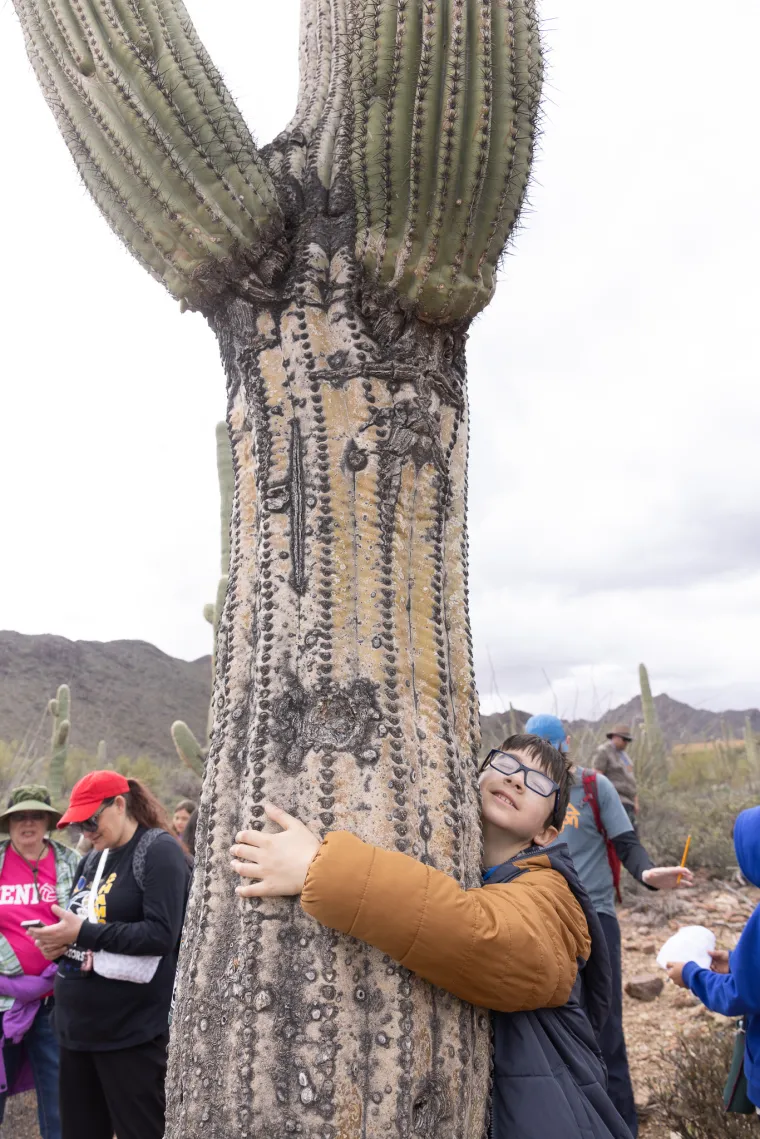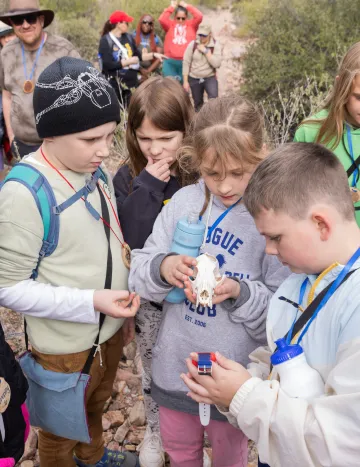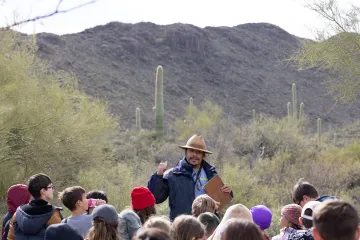Happy Campers
The Cooper Center for Environmental Learning, affectionately known as Camp Cooper, turns 60.

Zachariah Thurn hugs a saguaro.
Photos: Chris Richards
On a dark and stormy night in February, no fewer than 50 fourth graders were sleeping in cabins at Camp Cooper, chaperoned by a handful of parents. Located to the west of town in the Tucson Mountains, the camp is hidden away among mountain trails. They woke up to a gorgeous blue sky, and all they could see was nature.
The kids, from Lineweaver Elementary School, would be spending three days here. Some of them had never spent a night away from home. Some had never walked along a desert trail.
A staff educator at the camp, Isaac Silva ’21, who graduated with a bachelor’s in psychology, had planned an adventure for them. But first, they were gathering around their teachers, making sure their water bottles were full. As they set off, three little girls walked arm in arm. Off to the side, a boy seemed intent on climbing into a small cave to see what he could find, but he was cajoled back to his pals by his teacher.
Silva, a big man with a black beard, a wide-brimmed hat and a booming voice, led the way. He’d told the kids they were going to follow in the trail of a local naturalist — the fictional Professor EM — who’d kept field notes of what he’d observed. With a diary in hand, Silva invited the kids to look for hidden treasures: pack-rat middens, a decomposing saguaro and a rock in the shape of a triangle. The ramble mimicked a scavenger hunt, with each kid keeping their own log of what they saw.

Another staffer, Aliya McDonald ’22, a Camp Cooper alum herself who graduated with a bachelor’s in education, herded the young explorers along. “I came, I think, in the third grade and spent the night. It was fun! We had s’mores the night before, and in the morning, the sticks had been licked clean by some animals,” she said, laughing.
McDonald started her career as a regular classroom teacher and then had the good fortune to be hired at Camp Cooper last August. It’s a dream job for her. “It’s pretty rare that you get to be outside every day for work,” she says, “and getting to strengthen my own personal knowledge of local plants and wildlife has been really fun. The kids can create super-strong connections with nature that they wouldn’t get to do within the four walls of a classroom.”
Colin Waite, the camp’s director, smiled amid the excitement of the scavenger hunt. The camp started back in 1964, he said, after Herbert Cooper acquired the 10-acre site for the Tucson Unified School District. The camp was named after Cooper, who had been appointed coordinator of auxiliary agencies for TUSD in July 1953. The site was purchased as a potential location for a new school.
“Teachers from some of the westside schools knew that the district had this property, and they just started to bring their kids out,” Waite said. “No facilities, no trails, no staff. They just did it.”
Eventually, a naturalist named Chuck Hansen was named the camp’s first director, and a small staff was hired. “They put in some big military-style canvas tents,” Waite went on, “with concrete floors and big metal tent poles. Each had their own little campfires. Camp Cooper was born.”
In the 1970s, the tents were replaced with concrete block buildings, including bathrooms, that still stand. None had heating or cooling. Now, as Camp Cooper celebrates its 60th anniversary, big renovations are in the works thanks to generous donors and foundation grants. New bathrooms with composting toilets will be built, and the old bathroom building will be converted into a solar-powered shower house.
Since 2008, Camp Cooper has been a partnership between TUSD and the College of Education at UArizona, thanks to the efforts of then-Dean Bruce Johnson. Though still known affectionately as Camp Cooper, its proper name is the Cooper Center for Environmental Learning. The district owns the property and handles the maintenance and utilities, and the college provides the staff and operations. All positions except the director are funded through philanthropy. Currently, six outdoor educators work with teachers to design activities for the kids.

Camp Cooper’s Isaac Silva
McDonald isn’t the only Camp Cooper and UArizona alum who went on to a career in the environmental sciences. Many other Wildcats are paying it forward. Christine Goforth '04, for example, is the director of citizen science at the North Carolina Museum of Natural Sciences. She works with children on projects like helping them wrangle dragonflies.
Two other Camp Cooper alumni are well known in Tucson: Anthony Aldinger is famous around town as Mr. Nature of Mr. Nature’s Music Garden. He sings songs and tells stories about the great outdoors, sharing the wonders of the Sonoran Desert with school groups and other young audiences. Ray Clamons ’05, who earned a bachelor’s in architecture, runs Natural Building Works, designing straw-bale and rammed-earth buildings with environmentally friendly landscaping.
One of the Lineweaver teachers, Samantha Lauderdale ’02, who earned a bachelor’s in education, tells the story of a little boy who just might follow the footsteps of those Camp Cooper alumni. “It’s one of my all-time favorite memories,” she says. After his first night, he was not a happy camper. “[He] had been grumbling for a couple of days.” But despite the cold and the dirt, she persuaded him to hike up a high hill. Up they went, and what they found was a spectacular view of the mountains.
He was awestruck by what he saw: the open sky, the passing clouds, the changing colors, the rain in the distance. “I’ve never seen anything like this before,” he said.
